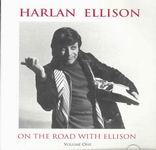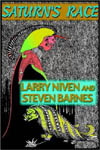
ed. – Here’s another audiobook narrated by, but not written by, Harlan Ellison
 A Wizard of Earthsea
A Wizard of Earthsea
By Ursula K. Le Guin; Read by Harlan Ellison and Ursula K. Le Guin
Audio Download – 6 hours [UNABRIDGED]
Publisher: Fantastic Audio (downloaded from Audible.com)
Published: 2003
ISBN: 1574535587 (Audio CD version)
Themes: / Fantasy / Series / Magic / Dragons / Wizards /
Just minutes into this audio book, the Kargs are attacking the village of Ten Alders, confused by a fog a young wizard has woven into an impenetrable shield, harried by invisible weapons and diaphanous shapes in the mist, and headed for certain destruction. You realize, as Harlan Ellison’s already non-standard voice rises in pitch and his words pile up against one another as he charges faster and faster through the narrative, pausing only to slurp back the fevered spittle he has worked up, that this is not your average narrator. His voice doesn’t resound with the Stradivarius polish of most professional performers, and his characterizations are neither entirely distinct nor consistent, but you can’t help yourself. He has you spellbound. And why? Because his is the authentic voice of a reader, one so caught up in the story that you can’t resist being pulled along with him on his journey.
And what a journey it is! A Wizard of Earthsea is brilliant, a notable gem even among the manifold wonders of such an accomplished author as LeGuin. It is the origin story of Ged, one of the most famous sorcerers in the world of Earthsea and a lesson in both the imprisoning power of our own dark deeds and the redemption that comes through facing them. It follows Ged from his home village of Ten Alders to the City of Gont, from there on to the great school for wizards on the central island of Roke, and then on a fearful, bold chase across the whole of Earthsea. Most island settings fairly drip with the damp richness of the Pacific Northwest, and the characters span a veritable rainbow of colors and cultures. This is epic fantasy in the European tradition, but with a distinctively American flavor.
As in so many of LeGuin’s works, truth is of paramount importance on Earthsea. The old language of Earthsea, like the psychic language that unites the planets in her science fictional Hainish universe, is a language in which men cannot lie. It is also the language in which the true names of all things are recorded, which makes it the basis of all magic on Earthsea. But this latter property also gives the old language of Earthsea Platonic overtones of ideal forms lurking behind every imperfect manifestation in nature, and lends A Wizard of Earthsea a palpable sense of great truth buried just below the surface of what we see. Thus, LeGuin subtly exhorts us to explore beyond the level of the richly imagined fantasy action. And what she has placed there is well worth spending the time to think about.
There are only two off-key notes in this work and its production. The first is that, though LeGuin is given co-narration credits, she only reads a very brief poetic prologue and an only slightly less brief prose epilogue. If you’re looking to experience the author interpreting a major work with her own voice, you’re not going to find that here. The second is that, though LeGuin is noted for her progressive, feminist opinions, some of what we see in this story seems almost misogynistic. There is only one female character who seems not to harbor outright selfishness, evil, or temptation; and female magic is given an unrepentant indictment in several places. I’m new to the series, so maybe these issues are redeemed in the later books. I certainly hope so.
In any case, this production of Ursula K. LeGuin’s A Wizard of Earthsea offers a dark, compelling glimpse at the forces behind the turning of the world as told in the raw, earnest voice of Harlan Ellison. My recommendation: Skip the TV miniseries—which LeGuin apparently hated—and spend your time marveling at the wonders of this quirky, enthralling audio book.
Posted by Kurt Dietz

 On The Road With Ellison, Volume 1
On The Road With Ellison, Volume 1

 A Wizard of Earthsea
A Wizard of Earthsea



 CBC Radio producer
CBC Radio producer